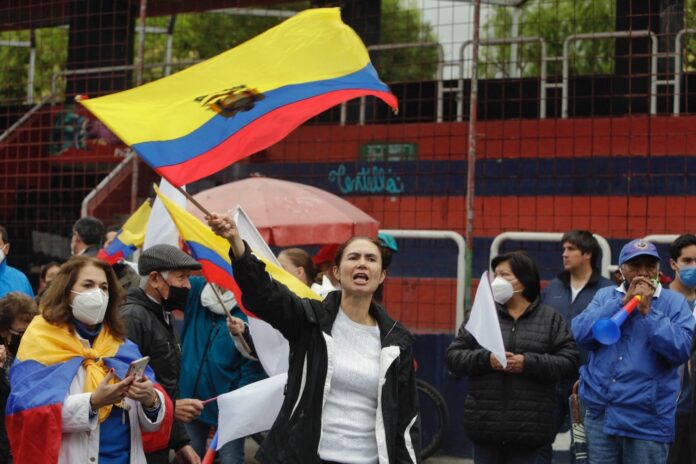Ecuador is experiencing a new déjà-vu that has taken it back to the 2019 protests, the same ones that opened a cycle of social revolts throughout the continent. Despite the economic measures proposed by the government of conservative Guillermo Lasso and when the state of exception is still in force for 30 days in three regions of the Andean country, including Quito, the conveners confirmed that they maintain the national strike and that they plan to march the capital. Same as in 2019.
“Let’s not allow our legitimate struggle to be damaged by violence and vandalism. We have a clear agenda that seeks concrete results, let’s act in unity,” cried the radical leader Leonardo Iza, current president of the Confederation of Indigenous Nationalities of Ecuador (Conaie). .
The indigenous group denounced this afternoon that Iza’s vehicle was shot at in the Andean city of Latacunga, capital of Cotopaxi. “We warn of this within the framework of the state of emergency ordered by the government in the provinces of Imbabura, Pichincha and Cotopaxi,” Conaie said in a statement, while the government insisted that it will not tolerate violence “against citizens, all the more so if the acts occur against those who criticize us, justified or not”.
Despite the state of emergency in force in the capital on the sixth day of the national strike, both students and social organizations have protested awaiting the arrival of the indigenous people, a classic in Ecuadorian protests. In Quito no one has forgotten the violence that unfolded in their city three years ago.
The Government is determined on this occasion not to prevail, although Parliament will study on Monday the possibility of repealing the decree of the state of exception after the agreement reached between the dissidents of the indigenous party Pachakutik, the Democratic Left and the Correismo caucus, whose bet is to overthrow the Lasso government. His leader, former President Rafael Correa, is on the run in Europe after being sentenced to eight years in prison for corruption. Through social networks he participates in the front row of the fight against the government.
During the 2019 protests, masked groups infiltrated among the indigenous people attacked and set fire to the Comptroller’s Office building in the capital, where part of the evidence against those accused in the Bribery Case was kept. Precisely another of those convicted, his former minister Vinicio Alvarado, is the main electoral strategist of the leftist candidate Gustavo Petro, who is playing the presidential elections in Colombia today, Sunday.
“Dialogue is the best way out to continue reaching agreements that provide solutions to the needs of Ecuadorians,” Lasso responded after approving eight urgent measures. These include the increase in the human development bond from 50 to 55 dollars, the declaration of an emergency in the public health system, the subsidy of up to 50% of the price of urea to small and medium-sized producers, and the forgiveness of credits overdue of up to 3,000 dollars by BanEcuador, among others, in addition to the promise not to upload gasoline, gas and diesel.
It is precisely the fuels that are once again at the center of the controversy, since Conaie demands the freezing and reduction of the price of gasoline as its main demand. An agenda very similar to the one that shook the country in 2019. Indigenous leaders have disqualified the government offers, calling them “ridiculous.”
Conforms to The Trust Project criteria








